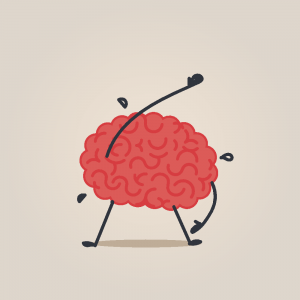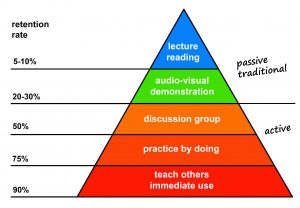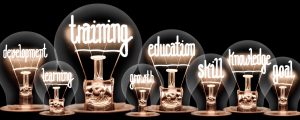Self-improvement, under the guise of self-help, was big in the 1970s, and it left a sour taste in many mouths. Now-a-days, self-improvement has several names: personal growth, personal or business development, or continuing education. These terms seem much more “acceptable” to most people. The question, though, is still, why should I do it?
For simplicity, and to reduce the “woo” factor, let’s skip all the other terms and stick with continuing education.
The Why of Continuing Education
When you think of it as continuing education, self-improvement is a good thing – especially for people in fields that advance, require special skills, or have the rules change. If you’re going to hire someone like that, you want them up on the latest and greatest so that you get the best results.
 A compelling argument for continuing education is the one that says an inactive brain is dying brain. Sort of the use-it-or-lose-it idea.
A compelling argument for continuing education is the one that says an inactive brain is dying brain. Sort of the use-it-or-lose-it idea.
Other than keeping my brain fit, why should I continue to educate myself? My profession doesn’t “require” continuing education and I wasn’t so hot at the traditional educational methods, so why go to the effort/agony?
Well, for one, my field may not require specific continuing education, but I’ve got a whole lot to learn about owning a business. There are so many things I could, and want, to be better at in the realm of my business. And while the school of hard knocks is how I’ve learned many lessons, I’m willing to learn from others as well. (I’d like to think that I don’t HAVE to learn from the school of hard knocks.)
Another thing? Being willing to learn is a huge positive to other people. Especially people who could hire me. That I want to learn about them, and their business, makes me unique.
Let’s not forget the fact that people who are open to new ideas tend to do better in society. (And that ends the political commentary for this blog.)
The How of Continuing Education
One nice thing about continuing education, especially for us in fields that don’t require it, is that you can choose the presentation method. I am a medicated insomniac; want to know the best way to put me to sleep? Put me in a lecture hall. You don’t even need to turn off the lights. Even for the classes I was interested in taking, staying awake during lecture was a challenge in college. Thus, I avoid long-winded presentations.

Because experience, mine and others, is my preferred learning method, I love mastermind and discussion groups. I’ve always been a better student of life. And for sure, mistakes provide better lessons than successes.
I also like the Lunch and Learn, a fairly common event in the business world. A short presentation, food, and you are good to go. They’re even better when the presenter brings the food.
Do you do well with the lecture environment, but don’t have lots of time? Webinars could be the thing for you. Listen for as long as you can, hit pause, and come back to it when you have a few more minutes. (They are also good for us fall-asleep types. It’s easy to go back to where you lost attention.)
All in All
OK, so what point have I made here? In broad strokes, improving yourself through education is a good thing:
- It keeps your brain fit
- It keeps you current in your field
- It keeps you current in life
- It makes you more hire-able
- People will find you more interesting
Additionally, there are so many ways to learn outside of the lecture/textbook stereotype of education – in case that doesn’t work for you:
- Workshops
- Small coaching groups
- Individual coaching
- Mastermind groups
- Webinars
- Conversations with professionals
- Life

Something I have learned, as I continue to do all this learning, is that no matter how much I know, my ignorance is so much bigger. Good thing I like playing on the educational playground of life, do you?
